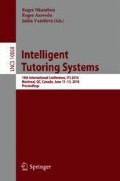Abstract
The performance and reactions of an individual in urgent situations vary according to his emotional states, which are subject to sudden changes. In medical situation, when patient’s life is in danger, the doctor’s emotional states are provoked and could affect his decisions. Virtual reality environments represent immersive situations in which we can dynamically simulate medical cases and particularly emergency cases. Using virtual reality and EEG devices, we can analyze the doctor’s emotional state and behavior without risk. In this paper, we propose to generate medical cases that can induce frustration or stress which can be at the origin of mistakes from the student. For that, we created a neurofeedback system named “Hypocrates” composed of a virtual reality environment, a medical cases generator and an intelligent agent. An experimental study involving 15 students in medicine was conducted to evaluate our approach. Results show that, the mistakes generally increase the frustration of medical students and decrease their performance.
Access this chapter
Tax calculation will be finalised at checkout
Purchases are for personal use only
References
Venkatraman, V., Dimoka, A., Pavlou, P.A., Vo, K., Hampton, W., Bollinger, B., Hershfield, H.E., Ishihara, M., Winer, R.S.: Predicting advertising success beyond traditional measures: new insights from neurophysiological methods and market response modeling. J. Mark. Res. 52, 436–452 (2015)
Chen, D., James, J., Bao, F.S., Ling, C., Fan, T.: Relationship between video game events and player emotion based on EEG. In: Kurosu, M. (ed.) HCI 2016. LNCS, vol. 9733, pp. 377–384. Springer, Cham (2016). https://doi.org/10.1007/978-3-319-39513-5_35
Biocca, F.: The cyborg’s dilemma: progressive embodiment in virtual environments [1]. J. Comput.-Mediat. Commun. 3 (2006)
Rose, F.D., Brooks, B.M., Rizzo, A.A.: Virtual reality in brain damage rehabilitation: review. Cyberpsychol. Behav. 8, 241–262 (2005)
Gorini, A., Riva, G.: Virtual reality in anxiety disorders: the past and the future. Expert Rev. Neurother. 8, 215–233 (2008)
Alvarez, R.P., Johnson, L., Grillon, C.: Contextual-specificity of short-delay extinction in humans: renewal of fear-potentiated startle in a virtual environment (2007)
Sherlin, L.H., Arns, M., Lubar, J., Heinrich, H., Kerson, C., Strehl, U., Sterman, M.B.: Neurofeedback and basic learning theory: implications for research and practice. J. Neurother. 15, 292–304 (2011)
Ben Abdessalem, H., Frasson, C.: Real-time brain assessment for adaptive virtual reality game: a neurofeedback approach. In: Frasson, C., Kostopoulos, G. (eds.) Brain Function Assessment in Learning. LNCS (LNAI), vol. 10512, pp. 133–143. Springer, Cham (2017). https://doi.org/10.1007/978-3-319-67615-9_12
Soleymani, M., Asghari-Esfeden, S., Pantic, M., Fu, Y.: Continuous emotion detection using EEG signals and facial expressions (2014)
Ghali, R., Ben Abdessalem, H., Frasson, C.: Improving intuitive reasoning through assistance strategies in a virtual reality game. In: The Thirtieth International Florida Artificial Intelligence Research Society Conference. AAAI, Florida (2017)
Acknowledgments
We acknowledge NSERC-CRD and Beam Me UP for funding this work.
Author information
Authors and Affiliations
Corresponding author
Editor information
Editors and Affiliations
Rights and permissions
Copyright information
© 2018 Springer International Publishing AG, part of Springer Nature
About this paper
Cite this paper
Ben Abdessalem, H., Boukadida, M., Frasson, C. (2018). Emotional State and Behavior Analysis in a Virtual Reality Environment: A Medical Application. In: Nkambou, R., Azevedo, R., Vassileva, J. (eds) Intelligent Tutoring Systems. ITS 2018. Lecture Notes in Computer Science(), vol 10858. Springer, Cham. https://doi.org/10.1007/978-3-319-91464-0_29
Download citation
DOI: https://doi.org/10.1007/978-3-319-91464-0_29
Published:
Publisher Name: Springer, Cham
Print ISBN: 978-3-319-91463-3
Online ISBN: 978-3-319-91464-0
eBook Packages: Computer ScienceComputer Science (R0)

